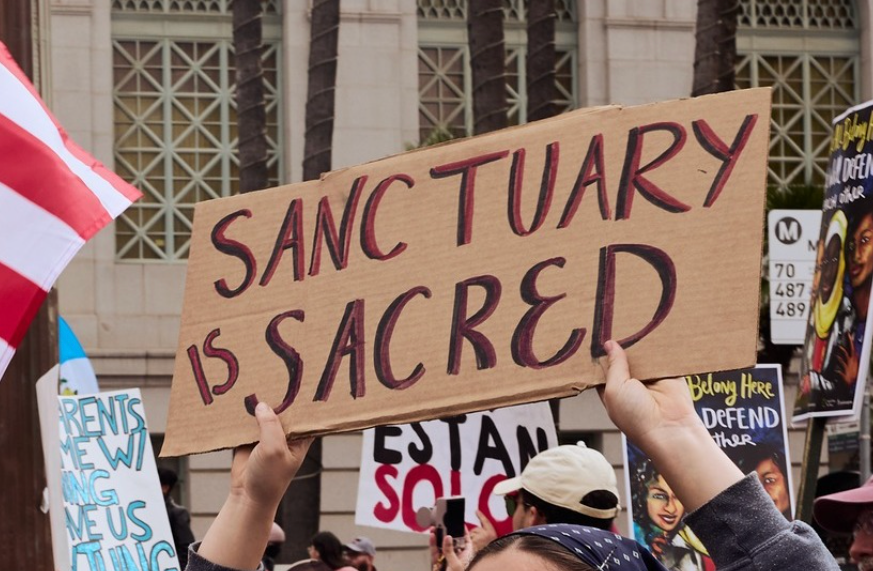In a recent report from the Center for the Study of Global Christianity at Gordon-Conwell Theological Seminary, it is estimated that one in 12 Christians in the U.S. are at risk of deportation or have a family member at risk of deportation; 80% of those at risk of deportation are Christian.
Trump’s mass deportation agenda is not only a political issue, but a Christian issue. I fear that, should the U.S. Christian community forfeit caring for their immigrant brothers and sisters for the sake of maintaining a political alliance, then the U.S. church forfeits its eternal duty to love the body of Christ. Offering sanctuary is one way to stand with the body of Christ and against a government that seeks to undermine the spiritual sanctity of our brothers and sisters.
During Missions Conference 2025, John Mark Comer, founding pastor at Bridgetown Church and a teacher and writer, spoke on the various problems with the American Evangelical movement.
“[Most American Christians] possess a nominal faith, that really is a syncretism … [that combines] the way of Jesus and the left and the right, and we see secularism on both sides, who is primarily consumeristic and whose primary reference point for spirituality is self-life not self-death,” Comer said.
I agree wholeheartedly with his analysis. In the U.S. church, I sense a deep discomfort with standing up against their preferred party, whether they align with conservative or liberal thought. Instead, it seems to me that sometimes American Christians allow themselves to be wholly consumed by the conservative or liberal branches, as though a human governmental authority could ever wholly align with the way of God.
What I will discuss in this article entails not violence, rioting, or disregard for the U.S. government, but a call to evaluate and possibly defy one of Trump’s policies that seeks to deride Church sanctuary, which I believe to be a direct attack against one of the Church’s responsibilities: to protect the safety and peace of its participants.
As you read, please contemplate Hebrews 13:13-14 that declares, “Therefore let us go to him outside the camp and bear the reproach he endured. For here we have no lasting city, but we seek the city that is to come.” In seeking to understand the problems with Trump’s policies, as Christians, we fully acknowledge that we have no lasting city tied to the Trump administration, but that we are bound to the city of God.
WHAT IS CHURCH SANCTUARY?
Tom Crisp, a philosophy professor who has extensively worked on understanding the ethics of Christ’s love command in relation to the marginalized, described sanctuary.
“It looks like housing undocumented refugees in our churches, providing them material support and legal aid, accompanying them to court cases, helping them find jobs and job training, drawing them into communities of care, worship and friendship,” Crisp said. “There was a small congregation with a large church building in the southland who saw offering their building as a way to put their faith into action, and decided to start doing sanctuary. CLUE [Clergy and Laity United for Economic Justice] then would learn of asylum seekers in need of housing, and activate their network of churches to find a place for them, including this small congregation.”
There is historical precedent for the practice of sanctuary, even since 426 AD. In “City of God,” Saint Augustine recalls the Visigoths’ sacking of Rome. The Visigoths committed all kinds of atrocities, brutally subjecting the city to destruction. However, they dared not commit an act of war within a church building out of respect for God. Nadya Williams, a professor of Ancient Greek and Rome, puts it this way in her article in Christianity Today: “Vicious to everyone and disrespectful of every other space, the Visigoths at least understood that churches were unique, a space set apart for God.”
Sanctuary developed from the idea that the Church’s sacred ground must not be violated by violence, force or injustice. The Church upholds a vision of altruism and safety by offering sanctuary to all, whether guilty or innocent, warrior or monk, king or commoner. The act of providing sanctuary, given by the Church and preserved by outside authorities, has been a long-standing tradition.
In the U.S., sanctuary in churches dates back to churches housing slaves along the Underground Railroad in opposition to the Fugitive Slave Act, protecting conscientious objectors to the Vietnam War and shielding refugees from Central America, as Valerie Munson describes in her article “On Holy Ground.”
In the 1980s, a new Sanctuary Movement began taking place, as a response to the Central American refugee crisis.
“Many fleeing civil wars in El Salvador and Guatemala were seeking asylum in the U.S., but the U.S. government would often deny them refugee status,” Crisp said, explaining the movement. “In response, churches along the U.S.-Mexico border began offering sanctuary to undocumented refugees, inspired by the Biblical tradition of sanctuary and the Underground Railroad of the 19th century. A new sanctuary movement started in the 2000s. That movement continues to the present day.”
Inside and outside the U.S., the Church has upheld sanctuary, preserving its identity as a place of peace and reconciliation by protecting and tending to the vulnerable and those in need.
Up until this administration, law enforcement and immigration officials avoided making arrests in schools and churches — sometimes because of specific policies adopted by various administrations, but mostly because public officials have long respected churches and schools as sacred places of safety and peace.
TRUMP’S POLICY
On Jan. 21, 2025, the Trump administration ratified a policy authorizing Immigration and Customs Enforcement (ICE) arrests in schools and churches.
“This action empowers the brave men and women in CBP [Customs and Borders Protection] and ICE to enforce our immigration laws and catch criminal aliens — including murders and rapists — who have illegally come into our country,” the policy reads. “Criminals will no longer be able to hide in America’s schools and churches to avoid arrest. The Trump administration will not tie the hands of our brave law enforcement and instead trusts them to use common sense.”
It is important to note that this is not a law but a policy that frames the Trump administration’s directives to law enforcement. It indicates that a person considered a “criminal alien” could be arrested during a church service or in the middle of a class. This directive does not have to do with individuals who are an imminent danger to a church or school (such as a shooter), but aims to label undocumented immigrants as “criminals.” This directly contrasts the goals of Church sanctuary that recognizes the sanctity of church buildings and promotes the compassion of the Church. This administration views the sacredness of Church sanctuary and the safety of schools as second to its goals of deportation.
WHY THE CHURCH MUST CARE
The Trump administration, which has explicitly curried favor with the U.S. church, endorses a policy that defies the traditions of church and state interaction, contradicting both the historical church and the historical U.S. church precedent. Notably, no arrests have yet been made within churches and schools, perhaps because of bad optics — although some have taken place outside of these sensitive areas. So why do it?
The Trump administration has proliferated the lie that all undocumented immigrants are criminals and rewrite acts of mercy as aiding criminals, despite how the terms “illegal immigrant” and “criminal alien” are legally incorrect when addressing undocumented immigrants, as the American Civil Liberties Union (ACLU) explains. As iterated in Arizona v. United States, unauthorized presence in the U.S. is a civil violation, not a criminal offense. But, to justify its goals of mass deportation of a population with incredibly low crime rates, the Trump administration must find ways that designate undocumented immigrants as criminals and vilify the people of faith committed to aiding those undocumented immigrants.
But the Church should be wary.
The Church should be wary when a worldly power attempts to define who can or cannot partake in the life and gifts of the eternal Church, when a government endeavors to undercut works of mercy, or when a government seeks to cut off one part of the body of Christ by labeling any person formed in the image of the imago dei “illegal.”
Regardless of one’s stance on undocumented immigration, we must acknowledge that all spiritual beings — all people — have a right to safety, sanctuary and a community of faith.
SHOULD THE CHURCH OPPOSE THE STATE?
Romans 13:1 and 6 says, “Let everyone be subject to the governing authorities, for there is no authority except that which God has established. The authorities that exist have been established by God … Give to everyone what you owe them: if you owe taxes, pay taxes; if revenue, then revenue; if respect, then respect; if honor, then honor.”
In light of this passage, I asked Crisp if the U.S. church should still seek to uphold sanctuary when the state very clearly opposes sanctuary.
“We should be subordinate, respectful and supportive of their role as government leaders, but that doesn’t mean we must obey them, especially when they are engaged in injustice,” Crisp said. “So, respect? Yes. Support in just aims? Yes. Obedience when commanded to do unjust things? No.”
The Church must be respectful of its governing bodies, but not to the extent of relinquishing its Christian identity. What Crisp and myself are advocating for is not violence or outright revolution, but prioritizing the way of Jesus above all other obligations.
ADVOCATE FOR SANCTUARY!
Advocate for sanctuary rights! Ask your local church if they might be willing to offer sanctuary to undocumented immigrants, while prayerfully weighing the possible risks. Sanctuary is not the only way to assist migrants, but it is one way of expressing the hospitality of the body of Christ that welcomes all peoples — whether or not they possess documents.
Michael Woolf, senior minister of Lake Street Church of Evanston in Illinois, charges churches to uphold sanctuary in a Sojourners’ article.
“Sanctuary is under attack, but just because it is embattled doesn’t mean that its defeat is imminent or that it has lost its incredible spiritual and practical power,” wrote Woolf. “Indeed, it is precisely in this context that we can live out our theology. If we believe that God is revealed in ‘the least of these’ then the least we can do is offer protection from cruelty.”
During this season of political polarization and angry rhetoric that seeks to make the marginalized a scapegoat, let us, as Christians, seek truth and care for the vulnerable by whatever means we can.
Consider Romans 13:8–10’s description of the Christian law: “Let no debt remain outstanding, except the continuing debt to love one another, for whoever loves others has fulfilled the law. The commandments, ‘You shall not commit adultery,’ ‘You shall not murder,’ ‘You shall not steal,’ ‘You shall not covet,’ and whatever other command there may be, are summed up in this one command: ‘Love your neighbor as yourself.’ Love does no harm to a neighbor. Therefore love is the fulfillment of the law.”
If a policy demands that we surrender God’s command to love our neighbor, might we — the Church — possess the strength to humbly defy the injustice demanded of us.






